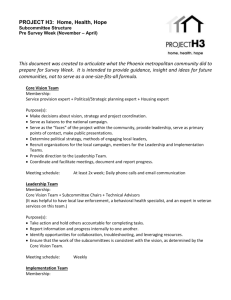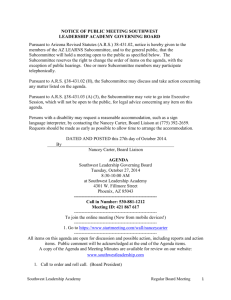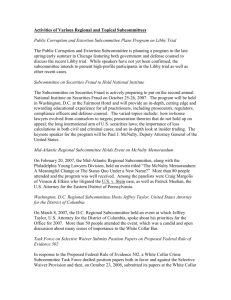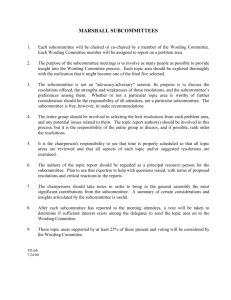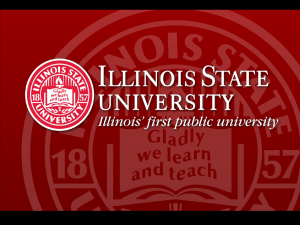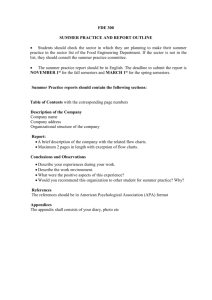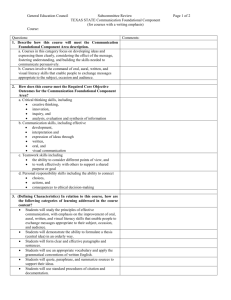Presidential Task Force on the Academic Calendar and System
advertisement
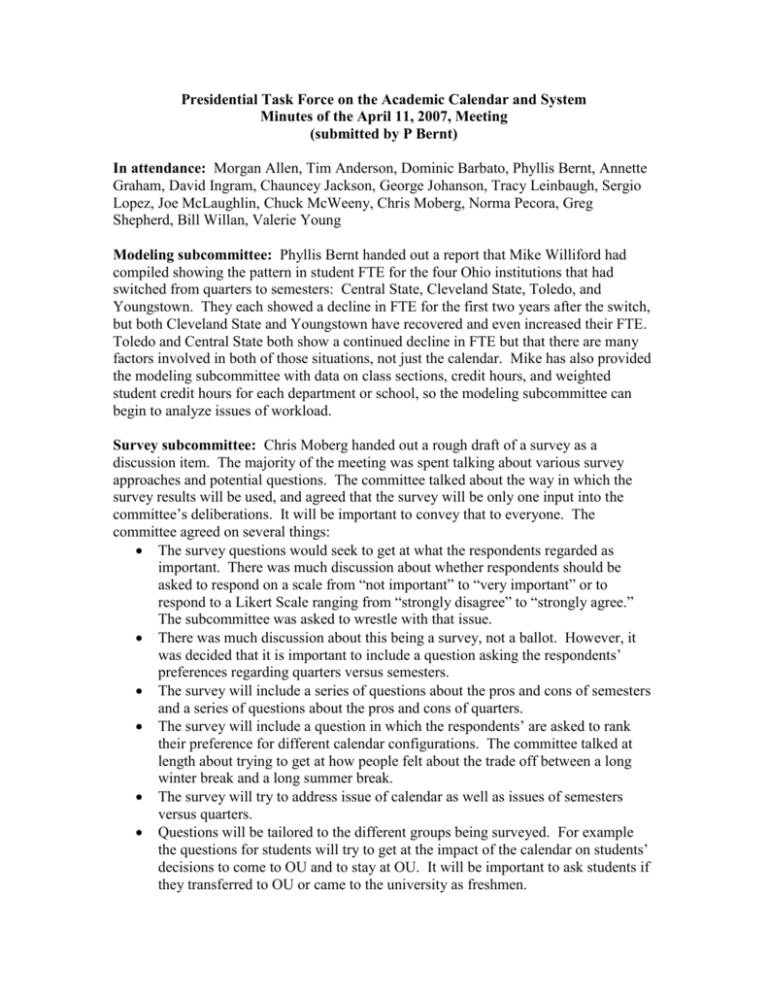
Presidential Task Force on the Academic Calendar and System Minutes of the April 11, 2007, Meeting (submitted by P Bernt) In attendance: Morgan Allen, Tim Anderson, Dominic Barbato, Phyllis Bernt, Annette Graham, David Ingram, Chauncey Jackson, George Johanson, Tracy Leinbaugh, Sergio Lopez, Joe McLaughlin, Chuck McWeeny, Chris Moberg, Norma Pecora, Greg Shepherd, Bill Willan, Valerie Young Modeling subcommittee: Phyllis Bernt handed out a report that Mike Williford had compiled showing the pattern in student FTE for the four Ohio institutions that had switched from quarters to semesters: Central State, Cleveland State, Toledo, and Youngstown. They each showed a decline in FTE for the first two years after the switch, but both Cleveland State and Youngstown have recovered and even increased their FTE. Toledo and Central State both show a continued decline in FTE but that there are many factors involved in both of those situations, not just the calendar. Mike has also provided the modeling subcommittee with data on class sections, credit hours, and weighted student credit hours for each department or school, so the modeling subcommittee can begin to analyze issues of workload. Survey subcommittee: Chris Moberg handed out a rough draft of a survey as a discussion item. The majority of the meeting was spent talking about various survey approaches and potential questions. The committee talked about the way in which the survey results will be used, and agreed that the survey will be only one input into the committee’s deliberations. It will be important to convey that to everyone. The committee agreed on several things: The survey questions would seek to get at what the respondents regarded as important. There was much discussion about whether respondents should be asked to respond on a scale from “not important” to “very important” or to respond to a Likert Scale ranging from “strongly disagree” to “strongly agree.” The subcommittee was asked to wrestle with that issue. There was much discussion about this being a survey, not a ballot. However, it was decided that it is important to include a question asking the respondents’ preferences regarding quarters versus semesters. The survey will include a series of questions about the pros and cons of semesters and a series of questions about the pros and cons of quarters. The survey will include a question in which the respondents’ are asked to rank their preference for different calendar configurations. The committee talked at length about trying to get at how people felt about the trade off between a long winter break and a long summer break. The survey will try to address issue of calendar as well as issues of semesters versus quarters. Questions will be tailored to the different groups being surveyed. For example the questions for students will try to get at the impact of the calendar on students’ decisions to come to OU and to stay at OU. It will be important to ask students if they transferred to OU or came to the university as freshmen. The subcommittee will work on the survey and will get a more finalized draft to the committee by the next meeting (and will be sharing drafts by email before that). The goal is to do the survey during the 7th week of the quarter if at all possible. Other Institutions subcommittee: David Ingram and Annette Graham reported that the subcommittee had chosen six institutions that had switched from quarters to semesters (University of Utah, University of Minnesota, University of Georgia, Auburn, Toledo, and Youngstown) and two institutions that had changed from semesters to quarters (University of Chicago and Wright State), and an institution that had decided not to make the shift from quarters to semesters (UC-Davis). David, Annette, and David Thomas will contact a faculty member in a corresponding school or college (i.e., Arts and Sciences, Health and Human Services, or Fine Arts) and a member of the corresponding dean’s office at each of these institutions. Chauncey Jackson will contact a student senate leader at the each institution. The subcommittee members will ask a series of questions, including why and when the institution made the shift (or did not), costs that were involved, how the decision was made, perceived impact on enrollment, regrets or benefits, impact on faculty workload, and specifics about curricular changes. Communication subcommittee: The committee of the whole discussed communication strategies. Among those mentioned were sending out email updates to all faculty, staff and student; links to the committee website from the various constituent groups’ websites; and open meetings. Because the target for the survey is the 7th week of the quarter, we need to plan the open meetings pretty quickly. The subcommittee (Sherrie Gradin, Chris Moberg, Norma Pecora, Bill Willan) will develop a communication plan. Functional areas subcommittee: Questions have been sent to a long list of areas asking for input about the impact of the calendar on their tasks and functions. The next scheduled meeting is April 25, 2007.

